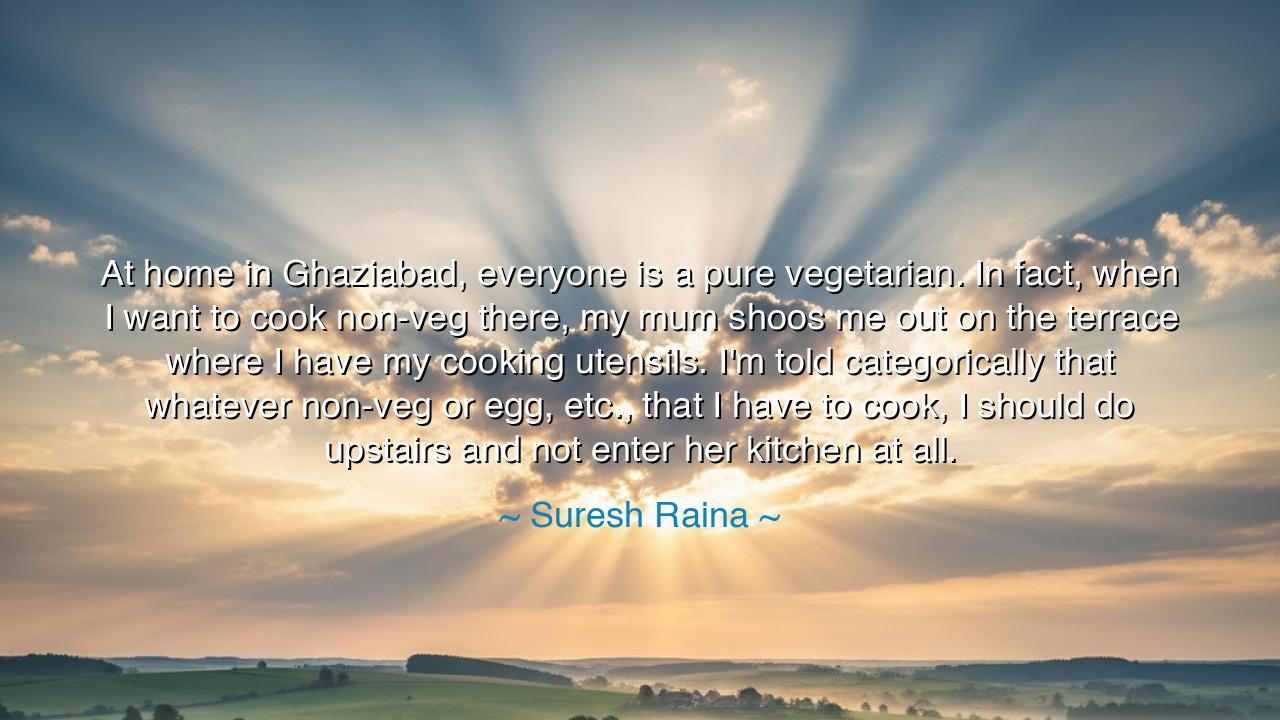
At home in Ghaziabad, everyone is a pure vegetarian. In fact
At home in Ghaziabad, everyone is a pure vegetarian. In fact, when I want to cook non-veg there, my mum shoos me out on the terrace where I have my cooking utensils. I'm told categorically that whatever non-veg or egg, etc., that I have to cook, I should do upstairs and not enter her kitchen at all.






In the courtyard of memory, Suresh Raina speaks with the frankness of a son: “At home in Ghaziabad, everyone is a pure vegetarian. If I wish to cook non-veg, my mum shoos me to the terrace; whatever egg or meat I must make, I do upstairs, and I must not enter her kitchen.” Hear in these lines not a quarrel, but an arrangement of love: a hearth guarded by custom, a son guided to the open air, where the smoke may rise without unsettling the sanctity below. This is the architecture of family—rooms of affection separated by maryādā, the boundary that turns chaos into order.
The ancients taught that a house is not merely walls and roof, but ritual space. The kitchen is its sanctum, a small temple whose fires must stay faithful to the vows of those who tend them. In one home the law is pure vegetarian, in another it is otherwise; each home binds itself to a rule so that it may taste not only food, but meaning. The son’s obedience—cooking non-veg on the terrace—is the old grammar of respect: he does not break his mother’s vow, nor deny his own appetite; instead, he learns the art of living together without violence.
Consider the story of Emperor Akbar, who sought sulh-i-kul, “peace with all,” amidst kitchens and courts of many faiths. Though not himself a strict vegetarian, he often restrained the royal hunts, moderated slaughter on holy days, and allowed every community to keep its food laws untroubled. He ruled a palace of a thousand tastes by honoring the thresholds of each kitchen; thus diversity became strength, not strife. Raina’s terrace is a humbler empire, but the principle is royal: harmony is built by honoring the other’s sacred line.
There is also the echo of Aśoka’s pillars—after the shock of Kalinga, he proclaimed gentleness toward creatures and urged restraint. Not every subject followed a vegetarian path, but the emperor bent policy toward compassion and compromise. So too the mother in Ghaziabad: she keeps her vow intact while granting her son a place to cook. Her “No—not in my kitchen” becomes a “Yes—upstairs,” and the house remains whole. A wise boundary does not crush desire; it redirects it to a space where kindness and conviction can share the same sun.
Mark how Raina laughs softly within the rule. He is “told categorically,” yet the telling is wrapped in maternal affection—the gentle “shoo,” the utensils kept ready on the terrace like exiles who still belong to the family. In this choreography we glimpse the oldest lesson of civilization: that freedom without form is noise, and form without love is stone. A son who steps onto the roof to honor a mother’s vow is performing a devotional act as surely as a priest tending a flame.
What, then, is the teaching we pass down? First, reverence for thresholds: every home, team, or city needs lines that are lovingly drawn and gently kept. Second, magnanimity in difference: feed your conscience without starving another’s dignity. Third, ritualized compromise: if the ground-floor cannot host a thing, build a stair. The terrace is not banishment; it is architecture for peace. As vessels are set apart for sweet and savory so that each may be true to its taste, so too lives can be arranged to protect conviction and preserve affection.
Practical steps for the modern hearth: name the non-negotiables of your home with kindness; write them not as edicts, but as promises. Create zones of respect—a shelf for sacred foods, a day for sacred quiet, a corner for sacred study. When conflict comes, search for the terrace solution: a time, place, or method that protects what is holy to one without humiliating the other. Share the story behind each custom, so children inherit meaning, not merely rule. And when you must go upstairs to honor love, go gladly; for the smoke that rises from such obedience becomes a blessing over the roof, and the house below keeps its peace, fragrant and inviolate.






AAdministratorAdministrator
Welcome, honored guests. Please leave a comment, we will respond soon